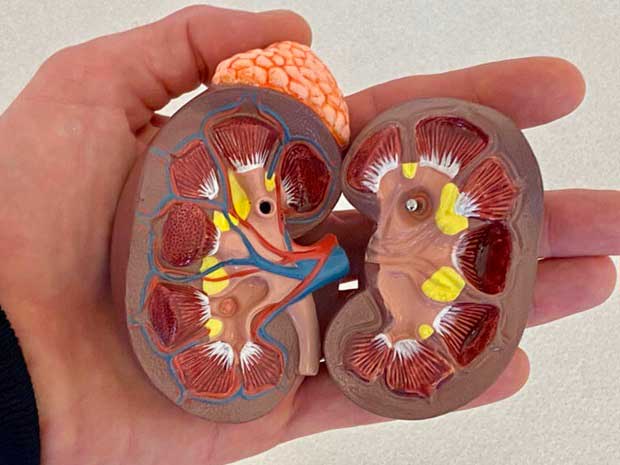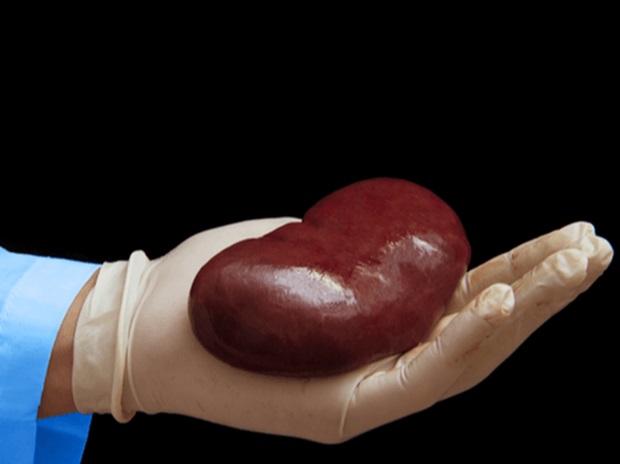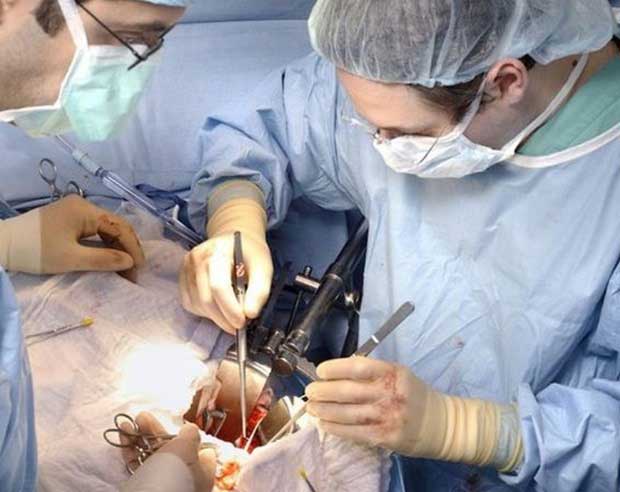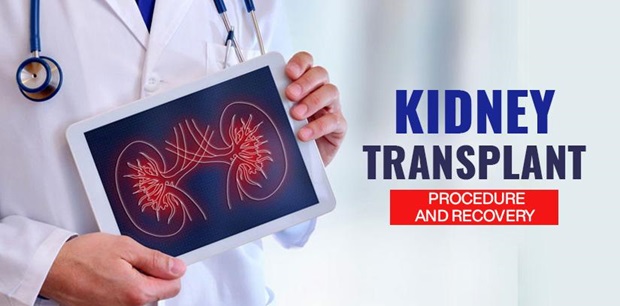
Medical Surgeries
Kidney Transplant


A kidney transplant is a surgical procedure in which a healthy kidney from a living or deceased donor is placed into a person whose kidneys are no longer functioning properly. This is typically done to treat end-stage renal disease (ESRD), a condition where the kidneys have lost their ability to filter waste products and excess fluids from the blood, leading to a buildup of toxins in the body.
There are two primary types of kidney donors:
Living Donor: In this case, a living person, often a family member or a close friend, donates one of their kidneys to the recipient. Living donor kidney transplants are generally preferred because they tend to have better long-term outcomes and shorter waiting times compared to deceased donor transplants.
Deceased Donor: Deceased donor kidney transplants involve receiving a kidney from an individual who has recently passed away but has previously consented to organ donation. Deceased donor kidneys are allocated based on various factors, such as medical compatibility and the urgency of the recipient's condition.
The transplantation process involves the surgical removal of the donor kidney, which is then placed into the recipient's body, typically in the lower abdomen. The recipient's own kidneys are not usually removed unless they are causing significant health problems. The transplanted kidney takes over the job of filtering the recipient's blood and regulating fluid and electrolyte balance, effectively restoring kidney function.


After a kidney transplant, recipients need to take immunosuppressive medications for the rest of their lives to prevent their immune system from rejecting the transplanted organ. These medications help to keep the body from attacking and damaging the new kidney. Regular medical monitoring and follow-up care are essential to ensure the success of the transplant and the recipient's overall health.
Kidney transplants have a high success rate, and they can significantly improve the quality of life for individuals with kidney failure. However, there are risks associated with the surgery and the lifelong use of immunosuppressive medications, so careful medical evaluation and ongoing care are crucial
Donor in kidney transplantation
These conditions may vary depending on the transplant center and the specific circumstances, but here are some general donor conditions for kidney transplant:
Compatibility: The donor's blood type and tissue type should be compatible with the recipient's to reduce the risk of rejection.
Good Health: Donors should be in good overall health, with no significant medical conditions that would increase the risk of complications during or after the surgery.
Age: There is no strict age limit for kidney donors, but older donors may be evaluated more rigorously.
Psychological Evaluation: Donors typically undergo a psychological evaluation to ensure they fully understand the risks and implications of donating a kidney.


Informed Consent: Donors must provide informed consent, demonstrating their willingness to undergo the surgery and their understanding of the potential risks and consequences.
No Infectious Diseases: Donors should be free from transmissible diseases, such as HIV, hepatitis, and other infectious conditions that could be passed on to the recipient.
Adequate Kidney Function: Donors should have two healthy kidneys, and the function of both kidneys should be assessed to ensure they are functioning properly.
No Chronic Medical Conditions: Certain chronic medical conditions, such as diabetes or high blood pressure, may disqualify potential donors, as these conditions can affect the long-term health of the remaining kidney.
No Significant Substance Abuse: Donors should not have a history of substance abuse or drug addiction.
Lifestyle Factors: Lifestyle factors like smoking and obesity may affect a donor's eligibility. Smoking is discouraged, and obesity may be a disqualifying factor in some cases.
It's important to note that the specific criteria for kidney donors can vary from one transplant center to another.
Before and after kidney transplant surgery:
there are several important steps and considerations for both the donor and the recipient. Kidney transplantation is a life-saving procedure for individuals with end-stage renal disease, and it can greatly improve their quality of life. Here's an overview of what to expect before and after the surgery:
Before Kidney Transplant Surgery:
Evaluation: The recipient undergoes a thorough medical evaluation to assess their overall health and suitability for transplantation. This evaluation includes blood tests, imaging studies, and other medical assessments.
Finding a Match: Finding a compatible donor is crucial. This can be done through living donors (usually a family member or friend) or deceased donors (organ procurement from deceased individuals). Various tests are performed to ensure compatibility.
Preoperative Preparations: Both the donor and recipient will have preoperative assessments, and their surgeries are scheduled. The medical team provides detailed instructions on fasting, medications, and other preoperative requirements.
Immunosuppression Medications: The recipient will be started on immunosuppressive medications before the surgery to prepare the immune system for the new organ and minimize the risk of rejection.
Psychological Evaluation: Recipients often undergo psychological evaluations to ensure they understand the procedure and are mentally prepared for the surgery.




After Kidney Transplant Surgery:
Recovery: The recipient typically spends several days in the hospital after the transplant to recover. The duration of the hospital stay may vary depending on individual circumstances.
Monitoring: Close monitoring is essential to ensure the kidney functions properly and to detect any complications. Blood tests and imaging are regularly performed.
Immunosuppression: The recipient will continue to take immunosuppressive medications for the rest of their life to prevent rejection of the transplanted kidney.
Lifestyle Changes: The recipient may need to make certain lifestyle changes, such as dietary modifications, increased fluid intake, and physical activity, to maintain kidney health.
Follow-Up Care: Regular follow-up appointments with the transplant team are essential. These appointments monitor kidney function, adjust medications, and address any issues.
Complications: While kidney transplant surgery is generally successful, there can be complications such as infection, rejection, and side effects from immunosuppressive drugs. It's important to be vigilant and report any concerning symptoms.
Emotional Support: Both recipients and donors may require emotional support to cope with the physical and emotional aspects of the transplant process.
Living kidney donors, also undergo their own preoperative evaluations and post-operative recovery process, which typically involves a shorter hospital stay and a quicker recovery compared to the recipient.
The success rate of kidney transplant surgery
The success rate of kidney transplant surgery can vary depending on several factors, including the health of the donor and recipient, the compatibility of the donor and recipient, and the skill and experience of the surgical team. Overall, a kidney transplant is considered one of the most successful organ transplant procedures.
The success of a kidney transplant is often measured by graft survival, which refers to how long the transplanted kidney functions. Kidney transplants typically have a high short-term success rate, with many grafts functioning immediately after surgery.


usually, The long-term success of a kidney transplant can also be excellent, particularly if the donor and recipient are well-matched in terms of compatibility. Many kidney transplants continue to function well for many years, and some can last for decades.
Also To maintain a successful transplant, recipients typically need to take immunosuppressive medications for the rest of their lives. These medications help prevent the recipient's immune system from rejecting the transplanted kidney.
Risk of kidney transplant
While kidney transplants can be highly successful, there are potential complications, such as organ rejection, infections, and side effects from immunosuppressive drugs. The risk of complications varies depending on the individual's health and medical history.


kidney transplant procedure
A kidney transplant procedure, also known as a renal transplant, is a surgical operation that involves replacing a damaged or non-functioning kidney with a healthy kidney from a living or deceased donor. Here is a simplified overview of the kidney transplant procedure:
Evaluation and Preparation, Donor Selection, Matching and Compatibility, Surgery, Post-Surgery Recovery, Hospital Stay one to two weeks , Follow-Up Care, Rehabilitation., Long-Term Care
Why Iran for a kidney transplant:
Iran is known for its kidney transplantation program for several reasons:
Government Support, Legal Organ Trade, Short Waiting Times, High Success Rates, Quality Healthcare Facilities
Our services include:
![]() our online services include: quotes and consultation
our online services include: quotes and consultation
![]() Planning the highest word-level medical trips and quality hospitals and medical centers according to the patient's request and budget.
Planning the highest word-level medical trips and quality hospitals and medical centers according to the patient's request and budget.
![]() Appointing treatments by the most skilled and experienced doctors.
Appointing treatments by the most skilled and experienced doctors.
![]() Airport pick-up/drop off, check-ups, accompanying translator, book hotel (for patients and their families)
Airport pick-up/drop off, check-ups, accompanying translator, book hotel (for patients and their families)
![]() Pre-hospitalization / post-hospitalization care services
Pre-hospitalization / post-hospitalization care services




All-Inclusive Medical Travel Packages
based on your budget, our team will assist you in choosing the best hotels, doctors, and medical centers. Our packages include:
 Airport Pickup Services
Airport Pickup Services Airport Dropoff services
Airport Dropoff services Hotel
Hotel Ticket
Ticket visa
visa translator
translator Transfer
Transfer SIM Card
SIM Card Sightseeing
Sightseeing
 why Iran
why Iran
Patients may choose to have abdominoplasty (commonly known as a tummy tuck) in Iran for a variety of reasons
Cost, Quality of Care, Privacy and Discretion, Combined Tourism, no Waiting Times
![]()
Fotros is an Iranian health tourism company with a professional team consisting of a support team and word-level doctors in medical and cosmetic surgeries like Neurosurgery, Rhinoplasty, Breast cosmetic surgeries, Liposuction, tummy tuck, etc.










 why Iran
why Iran